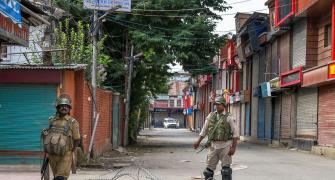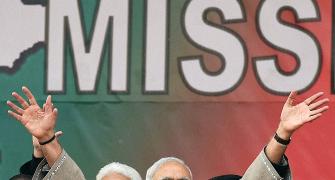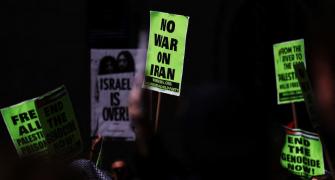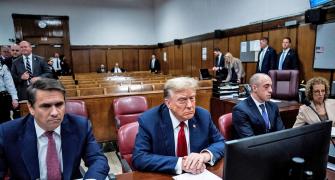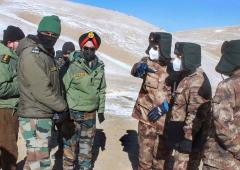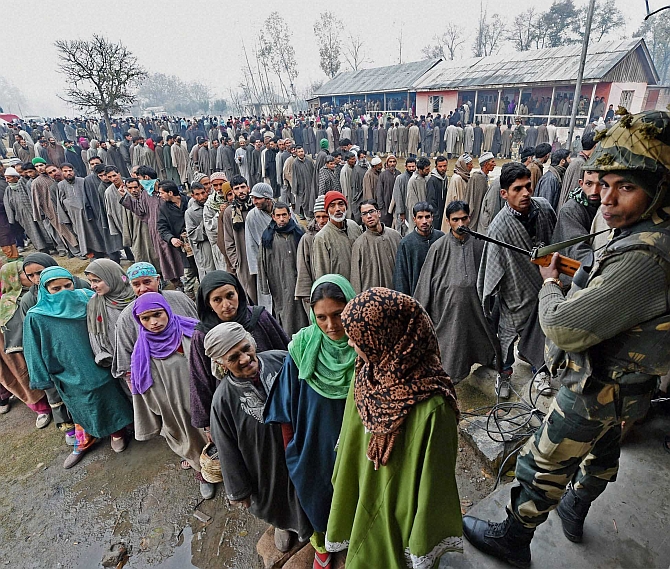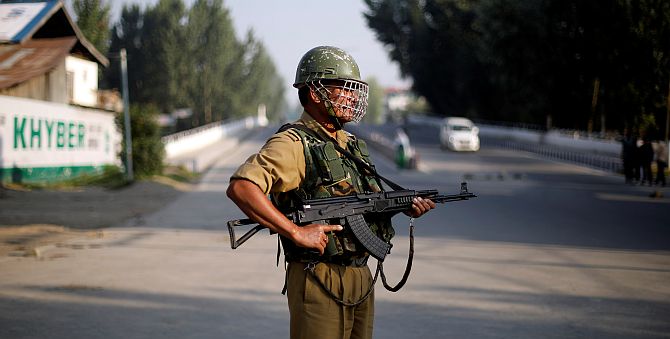'The BJP is very honest. They have said that they want to change the demographic composition and they are putting through their commitment.'
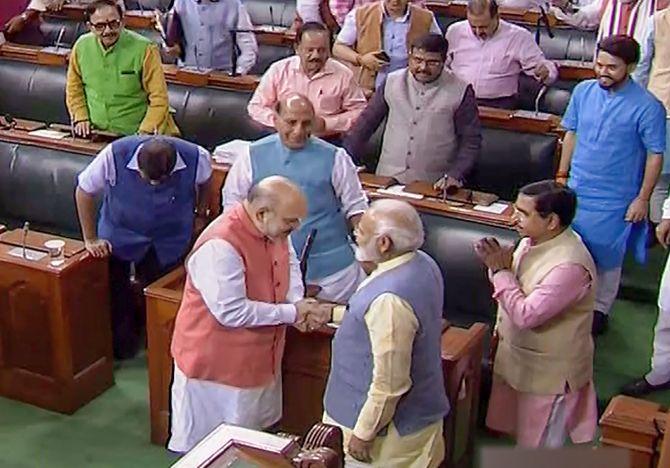
"Kashmir was not only the highest militarised zone in the world, but now they have brought in more troops. Every village, town, city, street is today full of troops," Mohammad Sayeed Malik, the distinguished commentator on Kashmir, tells Rediff.com's Archana Masih in the concluding segment of a two-part interview.
Part I: 'There is a dangerous political vacuum in Kashmir'
Do you fear that the political vacuum could be filled by hardline groups like the Jamaat-e-Islami?
Ideologically, Kashmiris are not prone to the ideas of the Jamaat-e-Islami.
Kashmiri Islam has close proximity to Hinduism. The character of Islam in Kashmir is different. Islam in Kashmir has not come through invasion, it has come though preaching and conversion.
Kashmir was originally Hindu, then it became totally Buddhist. Kanishka held the world Buddhist conference in Kashmir. Kashmiri Islam was influenced by Sufi preaching.
It is an amalgamation of Buddhism, Hinduism and Islam.
Kashmiri Islam has deities and loud prayers. It is a culture where you have Kashmiri Muslims fasting for a dargah which is almost like a Hindu temple. On those days they don’t eat onions, don’t touch meat. So Kashmiri Islam is different and has to be understood.
Kashmiris feel bad that they are not being trusted. It has created a dangerous political vacuum.
Whatever the government may do, they may call an election, get a percentage of people to vote -- Jammu will vote and they will say that 80% people came out to vote -- but Kashmir has been pushed into greater uncertainty.
Does this vacuum pose the danger of extremists filling in this space?
It could. A vacuum can suck in anyone. Militancy can get revived. Hardline pro-Pakistan politics may get revived.
Kashmir’s autonomy was only illusionary. It was hollow from inside. It was only being sold as an asset by the mainstream politicians. The separatists had nothing to do with it.
You had said in a 2017 interview that the integration (of Kashmir with the Indian Union) is technically and legally complete, but it is not so emotionally. How has the abrogation of Article 370 widened this alienation?
The divide has devastatingly widened with dangerous implications. When you go on to set an agenda and target people, it has consequences.
I am afraid the country at some time will have to take a look at that cost price.
Do you fear a backlash when curbs are lifted?
It may or may not be. I can’t visualise that.
When Jawaharlal Nehru removed Sheikh Abdullah in 1953, Kashmiris felt powerless. They couldn’t do anything, but 11 years later something happened -- a holy relic was removed from the Hazratbal shrine. This led to total upheaval in Kashmir.
It had nothing to do with politics, but it became the trigger for a political revolution which uprooted a 11-year-old regime.
Kashmir had made tremendous developmental and material progress during the Bakshi Ghulam Mohammed regime. I don’t think it has been matched since, but yet when the time came, the regime was thrown in the dustbin of history by Kashmiris.
The Kashmiris waited. I suspect there will not be an immediate reaction. Kashmiris will wait and take their time. They are the weaker party, what else can they do?
Kashmir was not only the highest militarised zone in the world, but now they have brought in more troops. Every village, town, city, street is today full of troops.
This time the Government of India has even lost the mainstream that it had earned over the years.
It is not as simple as they make it appear when they single out the Abdullahs and Muftis. They do not understand that down below they represent the people of Kashmir.
Do you see any advantages from the abrogation of Article 370?
The very fact that it was defined as temporary in the Constitution meant that it could not be permanent. But it did not mean that Kashmir had to be downgraded into a Union territory, its legislative assembly wound up, its separate flag removed when the primacy was always held by the Indian tricolour.
The first Article of the constitution of J&K said that it was an integral part of India. Almost 90% of parliamentary laws were already made applicable to J&K through presidential orders.
Indira Gandhi wanted the Emergency to be applied in Kashmir like the rest of India, and she did. Article 370 did not stop the GoI from applying its diktat in Kashmir like in the rest of India.
Article 370 was just notional. It just had an emotional appeal that it had a special status.
Effectively between August 15, 1947 to October 26, 1947, Kashmir was an independent State and the maharaja was in power. There was a peculiar situation in Kashmir because the maharaja refused to accede.
When tribals invaded Kashmir, Sheikh Abdullah went to Mahatma Gandhi. He requested him to send troops to Kashmir or Kashmir would be lost.
It was Sheikh Abdullah’s influence with Gandhiji and Jawaharlal Nehru and Sardar Patel that this was agreed and the Instrument of Accession was signed. It only gave three subjects to the GoI and the rest of the sovereignty remained with the maharaja.
The relationship was based on the sacred document and that has been violated and trampled. That’s why Kashmiris feel cheated. They have halved the emotional relationship immensely.
What is the Kashmiri’s greatest fear -- that the Muslim majority state’s identity will be dismantled by a majoritarian Indian State?
When the Congress said that Article 370 is not permanent, it was never clear what it meant. The BJP is very honest. They have said that they want to change the demographic composition and they are putting through their commitment.
They first wanted to abolish 370, they have.
They have abolished statehood.
Next they will change the composition of the population. People fear that this is the next logical step now.
The 1953 action against Sheikh Abdullah was politically motivated, this 2019 action is ideologically motivated.
That ideology has been amply explained in election manifestos.
Himachal Pradesh and Nagaland have local land prohibition Acts. Thirteen Indian states have these laws, why pick Kashmir alone?
It does lead to suspicion.
The government has said this will help in bringing development to the state
Development is hoax because Kashmir’s development index is much better than other Indian states and there is a reason for it.
In 1950, Sheikh Abdullah’s government -- the first popular government in the state -- had implemented revolutionary land reforms.
Land was given to tillers and you could not own more than 20 acres of land. Land distribution and land ownership revolutionised the rural economy. Dalits in Jammu also got benefit and even today they praise Sheikh Abdullah for that.
According to the law in Kashmir, only cultivators can own land in the state. Today unlike in other states, no one is houseless in rural Kashmir, nobody is in debt of money lenders.
Do you see a situation where people from other states will buy land in Kashmir?
So long as you are in government, you can do anything. Now that it is a Union territory, our assembly will have as less a voice as a municipality.
Even if they pass a law, we know what happened to the Delhi assembly. Suppose the government notifies the most environmentally sensitive area in Pahalgam or South Kashmir for acquisition, what can the assembly do?
If they sell land at minimum or cost price, how can anyone stop them?


